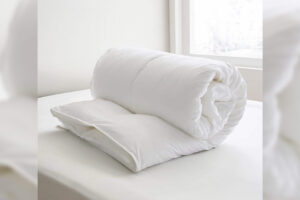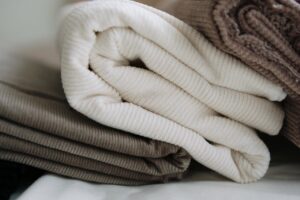Clothes alteration services are temporarily unavailable at all locations.
Should You Wash or Dry Clean a Duvet? The Complete Care Guide
- By White's Laundry
- 28 August 2025
Your duvet is one of the most important parts of your bedding, keeping you warm and comfortable every night. But when it comes to cleaning, many people wonder: should you wash a duvet at home or take it for dry cleaning? The answer depends on the material, filling, and care label instructions. In this guide, we’ll explore when washing is safe, when dry cleaning is better, and how to keep your duvet fresh, hygienic, and long-lasting.
Understanding Duvet Types
Before deciding on the cleaning method, it’s important to know what type of duvet you own:
- Down/Feather-Filled Duvets: Luxurious and warm but delicate. They can usually be washed at home if your machine is large enough, but improper drying can cause clumping.
- Wool Duvets: Naturally breathable and temperature-regulating, but prone to shrinking. These often require professional dry cleaning.
- Synthetic (Microfibre, Polyester) Duvets: Easy to care for and machine-washable, making them the most convenient option.
- Silk Duvets: Lightweight and luxurious, but extremely delicate. Almost always “Dry Clean Only.”
Washing a Duvet at Home
If your care label allows machine washing, here’s how to do it safely:
- Check Machine Size: Use a large-capacity washing machine (often found in laundromats) so the duvet has room to move.
- Use Gentle Detergent: Opt for a mild, non-biological detergent to protect the filling.
- Select the Right Cycle: A cool or warm gentle cycle is best.
- Prevent Clumping: Add clean tennis balls or dryer balls during the wash and dry cycle to keep the filling evenly distributed.
- Dry Thoroughly: Tumble dry on low heat until fully dry to avoid mould. Air drying is possible but takes longer.
Best for: Synthetic duvets, most down/feather duvets (if label permits).
When Dry Cleaning is the Better Option
Some duvets are too delicate for a washing machine and require professional care.
- Silk and Wool Duvets: Washing can damage the fibres. Dry cleaning preserves softness and structure.
- Special Finishes or Designer Duvets: If the duvet has embroidery, special stitching, or luxury covers, dry cleaning ensures no damage.
- “Dry Clean Only” Labels: Always follow manufacturer instructions to avoid voiding warranties or ruining the duvet.
Best for: Silk, wool, and luxury duvets.
Signs Your Duvet Needs Professional Cleaning
Even if your duvet is machine-washable, there are times when professional cleaning is the safer choice. Dry cleaners have the right equipment and expertise to restore freshness and shape in ways a home wash often can’t.
Consider professional care if you notice:
- Persistent stains or odours: Sweat, food, or pet accidents that don’t wash out.
- Loss of shape or uneven filling: Filling clumping or shifting that leaves lumpy spots.
- Flat or lifeless appearance: A thin, dull-looking duvet may need professional fluffing.
- Care label instructions: If it specifies “Dry Clean Only,” don’t take risks.
- Seasonal refresh: Even clean-looking duvets benefit from a deep professional clean once a year.
How Often Should You Clean Your Duvet?
Duvets don’t need weekly cleaning like sheets, but they still require regular care to stay fresh and hygienic.
- General Rule: Clean once or twice a year to remove dust, sweat, and allergens.
- With a Duvet Cover: Covers protect against dirt, so once a year is often enough.
- For Allergies: If you suffer from asthma or dust mite allergies, wash or dry clean every 3–4 months.
- With Pets or Kids: Families may need seasonal cleaning (every 3 months) to handle spills and odours.
- In Between Washes: Spot clean stains quickly, air out the duvet outdoors, and give it a weekly shake to keep the filling even.
- Seasonal Storage: Always clean before storing. Use a cotton bag instead of plastic to prevent moisture build-up.
Key Takeaway: Most people only need to clean their duvet once or twice a year, but lifestyle and health needs may require more frequent care.
Final Verdict: Home Wash vs. Dry Clean
So, should you wash your duvet at home or take it to the dry cleaner? It depends on the material and your needs:
- Synthetic Duvets (Polyester, Microfibre, Hollowfibre): Durable and affordable. Safe to wash at home if you have a large machine and dryer.
- Down and Feather Duvets: Can be washed at home but need plenty of space to dry. Dry cleaning is often easier and helps preserve loft.
- Wool Duvets: Almost always require dry cleaning to prevent shrinkage and damage.
- Silk Duvets: Too delicate for machine washing. Always dry clean.
Quick Tip: If you’re unsure or the duvet is expensive, choose professional cleaning. It’s cheaper than replacing a damaged duvet.
Conclusion
Caring for your duvet properly keeps it clean, fluffy, and long-lasting. While synthetic and some feather duvets can be washed at home, delicate fabrics like silk and wool should always be dry cleaned. Lifestyle factors, such as allergies, pets, or children, may also mean more frequent cleaning is necessary.
When in doubt, follow the care label. A little extra attention goes a long way in preserving comfort and hygiene, ensuring your duvet serves you well for years.




